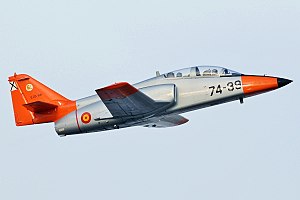| C-101 Aviojet | |
|---|---|
 Spanish Air Force C-101 | |
| General information | |
| Type | Advanced jet trainer and light attack aircraft |
| Manufacturer | CASA |
| Status | Operational |
| Primary users | Spanish Air and Space Force |
| Number built | 166 |
| History | |
| Introduction date | 17 March 1980[1] |
| First flight | 27 June 1977[1] |
The CASA C-101 Aviojet is a low-wing single engine jet-powered advanced trainer and light attack aircraft designed and manufactured by Spanish aircraft company Construcciones Aeronáuticas SA (CASA).
The C-101 was developed in response to a Spanish Air Force requirement, which needed a replacement for the outdated Hispano Saeta. During 1975, CASA commenced work on what would become the C-101. In addition to its own design team, technical assistance was provided by Germany's Messerschmitt-Bölkow-Blohm (MBB) and the United States' Northrop. In June 1977, the first of four prototypes performed the type's maiden flight. The design was somewhat reminiscent of other jet trainers of the era, such as the BAE Hawk and the Alpha Jet, but was less aerodynamically sophisticated, being equipped with an unswept wing. Performance of the C-101 during flight testing was reported in excess of predictions.
On 17 March 1980, the first examples were introduced to operational service with the Spanish Air Force, which would be the principal customer for the C-101. The initial model possessed only a limited weapons capability, this attack capability was expanded upon later-built aircraft.[2] Several models were exported to overseas operators; the C-101 has been adopted by the Chilean Air Force, Honduran Air Force and the Royal Jordanian Air Force. A final improved model, designated C-101DD, was demonstrated but did not find customers and thus it did not enter serial production. In addition to its use as a trainer aircraft, it has been used to perform aerobatics; in the latter context, it has been flown by the Patrulla Aguila aerobatics team. As of 2019, the C-101 remains in service in the Spanish Air Force and several other countries.
Early on in the 2010s there were talks about the replacement of the C-101. Finally, in 2020 it was decided that the C-101 would be replaced by the Pilatus PC-21[3] (24) and the Airbus Future Jet Trainer[4][5](50 - 55).[6]
- ^ a b Taylor 1982, p. 180.
- ^ Jackson 2011, p. 175.
- ^ "Spanish Air Force Procures 24 Pilatus PC-21 Trainer Aircraft". DEFPOST. Retrieved 9 November 2020.
- ^ "Airbus Looks to Create New Jet Trainer for Spanish Air Force". Aviation Today. Retrieved 9 November 2020.
- ^ "Airbus pitches new trainer jet for Spain, but with eyes for Europe". DefenseNews. Retrieved 9 November 2020.
- ^ "Airbus propone un avion entrenador español capaz de portar armamento". Infodefensa.com. Retrieved 9 November 2020.